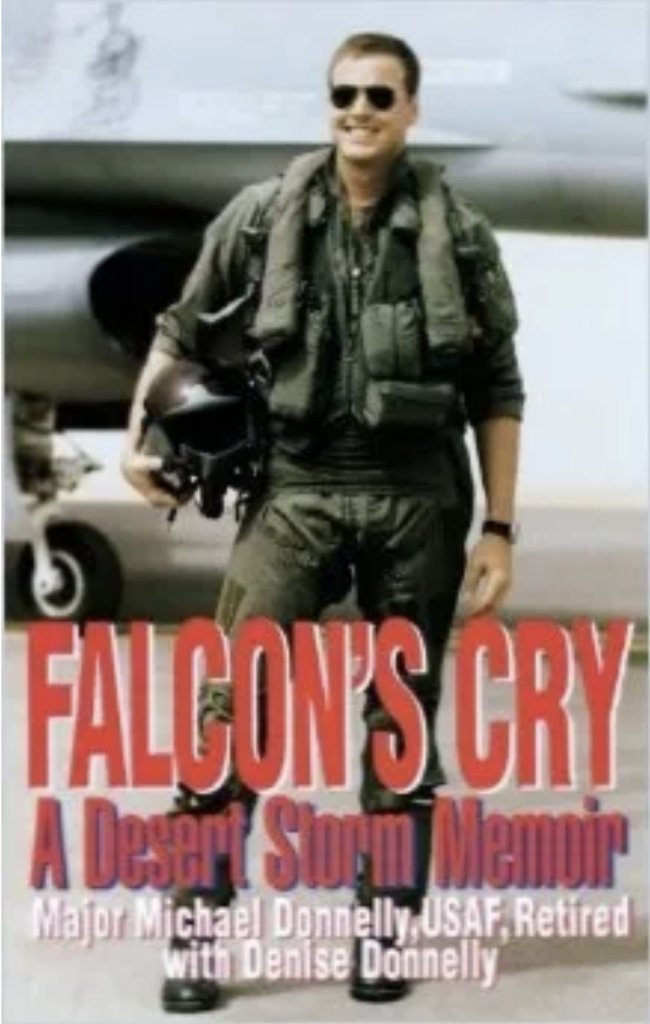
Please Follow us on Gab, Minds, Telegram, Rumble, Gettr, Truth Social, Twitter
For Memorial Day 2024, Connecticut Commentary is pleased to direct the reader’s attention to “A letter to Major Donnelly's son” that appeared in July 2005.
Memorial Day is, at the name suggests, a day set aside to remember our warrior heroes.
Many men and women in service carry their wounds home with them when they leave service. On Major Donnelly’s retirement, I brought my mother and wife with me to welcome him home upon his return. Both were wondrously affected, but we did not know at that moment how deep and fatal his wound was.
His obituary in the Hartford Courant mentions that Donnelly died, age 46, “after a relentless ten-year battle with amyotrophic lateral sclerosis (ALS), also known as Lou Gehrig's disease.”
During his 15 years as a fighter pilot, “he flew first the A-10 Warthog and then the F-16 Falcon. During Operation Desert Storm he completed 44 F-16 combat missions over Iraq as a member of the 10th Tactical Fighter Squadron stationed at Hahn Air Force Base in Germany. [He] trained NATO fighter pilots from over 16 countries and developed entirely new flying operations for the largest flying training wing in the world.”
While in service, he was awarded many medals, including the Meritorious Service Medal for outstanding service to the United States, the Air Force Commendation Medal with four oak leaf clusters, the Air Force Achievement Medal and the Top Gun award.
“Diagnosed with ALS in 1996,” his obituary notes, “Major Donnelly spent the next nine and a half years in the service of his fellow gulf war veterans, thousands of whom are suffering from a host of debilitating and life-threatening illnesses brought about by exposure to nerve agents and other toxins, spent depleted uranium munitions and experimental vaccines. In 1998, Major Donnelly published a book, Falcon's Cry: A Desert Storm Memoir that chronicled his struggle. Untiring in his labors, he testified before Congress, appeared on numerous television and radio news and talk shows and granted interviews to countless newspapers and magazines for as long as his faculties allowed and even after they no longer did.”
Major Donnelly met the war outside and the war inside with uncommon valor. In large part as a result of his testimony before Congress, the Congress changed its medical presumptions. Before Donnelly’s testimony, the U.S. Government presumed that illnesses occurring after service were unconnected with military services performed. It was the burden of stricken soldiers to prove that their illness was war related before the U.S. paid for their medical service costs. This presumption eventually was redirected so that the presumption would lie in favor of the stricken soldier.
The author of Connecticut Commentary knew Major Donnelly well. He knew his tirelessly supportive family well.
Memorial Day is a day of remembrance for those who, in Abe Lincoln’s words, “… gave up their last full measure of devotion” so that “this nation, under God, shall have a new birth of freedom—and that government of the people, by the people, for the people, shall not perish from the earth.”
It is memory that keeps alive the eternal body of goodness, heroism and love -- especially love-- that endures when, ashes to ashes, dust to dust, the body is disposed of. Major Donnelly, even after all these years, is alive in our memories – more alive, for some of us, than the neighbors to whom we daily wish good morning.
This should be the day when all the stones at Arlington National Cemetery and all the monuments of war heroes arrayed in our towns and cities cry out to us in the words of Sam Adams “If ye love wealth better than liberty, the tranquility of servitude better than the animating contest of freedom, go home from us in peace. We ask not your counsels or arms. Crouch down and lick the hands which feed you. May your chains set lightly upon you, and may posterity forget that ye were our countrymen."
